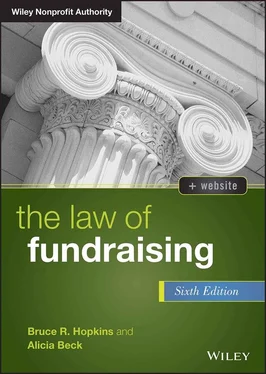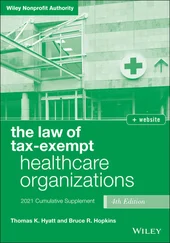Bruce R. Hopkins - The Law of Fundraising
Здесь есть возможность читать онлайн «Bruce R. Hopkins - The Law of Fundraising» — ознакомительный отрывок электронной книги совершенно бесплатно, а после прочтения отрывка купить полную версию. В некоторых случаях можно слушать аудио, скачать через торрент в формате fb2 и присутствует краткое содержание. Жанр: unrecognised, на английском языке. Описание произведения, (предисловие) а так же отзывы посетителей доступны на портале библиотеки ЛибКат.
- Название:The Law of Fundraising
- Автор:
- Жанр:
- Год:неизвестен
- ISBN:нет данных
- Рейтинг книги:4 / 5. Голосов: 1
-
Избранное:Добавить в избранное
- Отзывы:
-
Ваша оценка:
- 80
- 1
- 2
- 3
- 4
- 5
The Law of Fundraising: краткое содержание, описание и аннотация
Предлагаем к чтению аннотацию, описание, краткое содержание или предисловие (зависит от того, что написал сам автор книги «The Law of Fundraising»). Если вы не нашли необходимую информацию о книге — напишите в комментариях, мы постараемся отыскать её.
The Law of Fundraising
The Law of Fundraising
The Law of Fundraising — читать онлайн ознакомительный отрывок
Ниже представлен текст книги, разбитый по страницам. Система сохранения места последней прочитанной страницы, позволяет с удобством читать онлайн бесплатно книгу «The Law of Fundraising», без необходимости каждый раз заново искать на чём Вы остановились. Поставьте закладку, и сможете в любой момент перейти на страницу, на которой закончили чтение.
Интервал:
Закладка:
Using a somewhat similar approach, a few states require a professional solicitor to provide the charitable organization involved with an accounting after the conclusion of a solicitation.
Some states require a solicitor to carry a solicitation card that contains certain information and to display the card to prospective donors.
§ 3.18 FIDUCIARY RELATIONSHIPS
Another relatively recent category of provision to emerge in state charitable solicitation acts is the one adopted by a few states, which statutorily (as opposed to by means of the common law) makes professional fundraisers and/or professional solicitors fiduciaries with respect to the charitable organization involved. 73 This designation, among other outcomes, increases the legal liability of these persons. A typical provision of this nature states that every person soliciting, collecting, or expending contributions for charitable purposes, and every officer, director, trustee, and employee of any such person concerned with the solicitation, collection, or expenditure of such contributions, is deemed to be a fiduciary and acting in a fiduciary capacity.
§ 3.19 POWERS OF ATTORNEY GENERAL
Frequently, a state charitable solicitation statute invests the state's attorney general (or, occasionally, some other official) with specific powers in connection with administration and enforcement of the statute. 74 Usually, the attorney general is authorized to investigate the operations or conduct of charitable organizations, professional fundraisers, and professional solicitors who are subject to the statute, and to issue orders having the same force and effect as a subpoena. The attorney general is often expressly empowered to initiate an action in court to enjoin, preliminarily or permanently, a charitable organization, professional fundraiser, professional solicitor, or other person who engages in a method, act, or practice in violation of the statute or a rule or regulation promulgated in connection with the statute; or employs or uses in a solicitation of charitable contributions a device, scheme, or artifice to defraud, or to obtain money or property by means of any false pretense, deception, representation, or promise.
Occasionally, the attorney general is collaterally granted some or all of this authority with respect to individuals or organizations masquerading as charitable organizations or as charitable organizations entitled to an exemption from the statutory requirements. Thus, the statute may empower the state's attorney general to institute legal action against a charitable organization or person which or who operates under the guise or pretense of being an organization or person exempted by the act and is not in fact an organization or person entitled to such an exemption.
These state statutes usually include the obligatory provision that they may not be construed to limit or restrict the exercise of powers or performance of duties of the attorney general that he or she otherwise is authorized to exercise or perform under any other provision of law. The charitable solicitation act is likely to explicate this principle, by providing that the attorney general must enforce the due application of funds given or appropriated to public charities within the state and prevent breaches of trust in the administration thereof.
§ 3.20 MISCELLANEOUS PROVISIONS
In several states, a solicitor is required to place contributions in an account at a financial institution; in most of these states, the account must be solely in the name of the charitable organizations involved.
In some states, charitable organizations and/or professional solicitors are required to timely send confirmations or receipts of contributions to the donors. The law may provide an opportunity for a donor to subsequently cancel a contribution. In a few states, the solicitation of contributions in the state is deemed to be doing business in the state.
The laws in some states mandate a public education program as to charitable giving and fundraising abuses.
In most states, the regulatory officials are expressly granted the authority to promulgate rules and regulations to accompany the particular state's charitable solicitation act.
In some states, the law provides that county or municipal units of government may adopt other and/or more stringent requirements regarding the solicitation of charitable contributions and, expressly or impliedly, that these requirements will not be preempted by the state law. This rule is sometimes referred to as the municipal option .
In a few states, a provision makes it clear that the charitable solicitation law may not be construed to restrict the exercise of authority generally accorded to the state's attorney general.
Occasionally, the regulators must make an annual report to the governor and the legislature on the activities with respect to charitable solicitations in the state. In a few states, the regulators must maintain a registry of charitable organizations or professional solicitors.
The law may authorize a commission or council to serve, in an advisory capacity and/or otherwise, as part of the administration of the state's charitable solicitation act.
In a few states, there are limitations as to use of the telephone for charitable solicitation purposes, particularly where the callers are compensated. One jurisdiction flatly prohibits the practice. 75 Others state the hours during which the calls may be made, either by a charitable organization, a professional fundraiser, or a professional solicitor. The law may prohibit a gift solicitation by telephone where there is harassment, intimidation, or torment.
§ 3.21 SANCTIONS
The means of enforcing a state charitable solicitation act are plentiful. The principal enforcement mechanisms, which come into play upon the occurrence of one or more violations of the act, are the following: authorization of the revocation, cancellation, or denial of a registration; authorization of an investigation by the appropriate governmental officials; authorization of injunctive proceedings; authorization of the levying of fines and other penalties; and authorization of the imposition of criminal penalties (including imprisonment). Many states characterize violations of these statutes as misdemeanors, with specific penalties referenced elsewhere in the state's code of laws. One state mandates loss of tax-exempt status as a sanction, while some states affirmatively recognize private actions.
In some states, a violation of the state's charitable solicitation act simultaneously constitutes a violation of the state's unfair trade practices or deceptive practices law.
In all of the jurisdictions, a person may be found to have committed a fraud against the public, in the setting of the solicitation of charitable gifts. 76
§ 3.22 UNIFIED REGISTRATION
The National Association of State Charities Officials and the National Association of Attorneys General developed a project to standardize, simplify, and economize the process of registration pursuant to the states' charitable solicitation laws. This project is manifested in the Unified Registration Statement (URS). The URS is part of a larger effort by these organizations to consolidate the information and data requirements of all states requiring registration by charitable organizations engaged in fundraising.
The URS effort consists of three phases: (1) compilation of an inventory of registration information demands from all of the states, (2) production of a format (or form) that incorporates all or most of these demands, and (3) encouragement of the states to accept this standardized format as an alternative to their own forms. This project is ongoing; at present, 36 states are participating in it. A number of states, however, request additional information, entailing supplementary forms. 77
Читать дальшеИнтервал:
Закладка:
Похожие книги на «The Law of Fundraising»
Представляем Вашему вниманию похожие книги на «The Law of Fundraising» списком для выбора. Мы отобрали схожую по названию и смыслу литературу в надежде предоставить читателям больше вариантов отыскать новые, интересные, ещё непрочитанные произведения.
Обсуждение, отзывы о книге «The Law of Fundraising» и просто собственные мнения читателей. Оставьте ваши комментарии, напишите, что Вы думаете о произведении, его смысле или главных героях. Укажите что конкретно понравилось, а что нет, и почему Вы так считаете.












